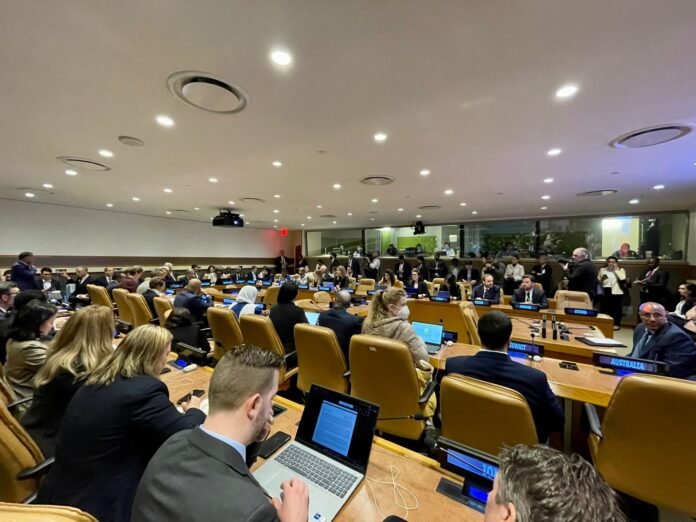NEW YORK, MAY 24 – With the Horn of Africa facing the combined impacts of a historic drought, conflict and economic shocks, donors at a United Nations-backed event today announced US$2.4 billion to provide life-saving and life-sustaining assistance for nearly 32 million people across Ethiopia, Kenya and Somalia. The high-level conference was co-organized by Italy, Qatar, the United Kingdom, and the United States, in collaboration with the governments of Ethiopia, Kenya, and Somalia. The funds announced today will allow humanitarian agencies to sustain aid pipelines of food, water, health care, nutrition and protection services.
“We welcome the announcements of support for the people of the Horn of Africa, who need our sustained commitment to recover from a crisis of catastrophic proportions,” said Joyce Msuya, Assistant Secretary-General for Humanitarian Affairs and Deputy Emergency Relief Coordinator. “We must persist in pushing for stepped-up investments, especially to bolster the resilience of people already bearing the brunt of climate change.”
 With “crisis atop of crisis” threatening millions, the international community cannot afford to stand idly by, Secretary-General António Guterres said at the pledging event at UN Headquarters in New York. “We must act now to prevent crisis from turning into catastrophe,” Mr. Guterres said. The UN chief assured that “action will make all the difference.” Last year, donors delivered life-saving assistance to 20 million people and helped avert a famine. He called however for increased support for humanitarian plans for the region which are currently less than 20% funded. This is “unacceptable”, he said, warning that without an immediate financial injection, “emergency operations will grind to a halt, and people will die.”
With “crisis atop of crisis” threatening millions, the international community cannot afford to stand idly by, Secretary-General António Guterres said at the pledging event at UN Headquarters in New York. “We must act now to prevent crisis from turning into catastrophe,” Mr. Guterres said. The UN chief assured that “action will make all the difference.” Last year, donors delivered life-saving assistance to 20 million people and helped avert a famine. He called however for increased support for humanitarian plans for the region which are currently less than 20% funded. This is “unacceptable”, he said, warning that without an immediate financial injection, “emergency operations will grind to a halt, and people will die.”
Today’s event was held as improved rains are starting to ease the impacts of the drought, but they also bring new risks and challenges. Floods have already caused widespread damage and affected at least 900,000 people. More flooding is expected later this year, partly due to the forecasted El Niño phenomenon, potentially leading to further displacement, death and disease.
Despite the relief brought by the rains, it will take years to recover from the historic drought. Representatives from non-governmental organizations, Member States and experts debated solutions, ranging from long-term investment in people and infrastructure to alternative ways for people to earn a living and adapt to climate change.
Tajani, actions cannot be limited to most immediate needs
“Now more than ever, as global humanitarian needs soar, our action cannot be merely limited to meeting the most immediate needs but should also be tailored to finding solutions and prevent a further deterioration,” stressed Antonio Tajani, Deputy Prime Minister and Minister of Foreign Affairs and International Cooperation of Italy. “The international community must invest further in the link between humanitarian and development action as a way to ensure that interventions on the ground have both immediate effects as well as durable benefits.” Speaking from Rome, Tajani emphasized the importance of working on initiatives with “lasting effects” in which “Italian companies will also play their part” through a “partnership on equal footing with African countries, based on shared objectives and mutual benefits.” The head of the Italian Foreign Ministry also announced that Giorgia Meloni’s government is working on a new “Mattei Plan” as part of a broader European Marshall Plan to support key sectors such as agro-industry, energy transition, employment opportunities, cultural heritage, and investments in the United Nations’ good governance and rule of law objectives.
Italy’s Cirielli pledges 70 million Euros
Representing Italy at the Conference in New York, was Deputy Foreign Minister Edmondo Cirielli: “We have achieved a significant result not only from a humanitarian standpoint but also in terms of important political implications,” he observed after the Conference stating that the Horn of Africa “represents a central element for the stability of both Central and Northern Africa.” During his address, Cirielli announced Italy’s commitment of 40 million euros to the UN Humanitarian Response Plans, in addition to another 30 million euros (totaling 70 million Euros) for development initiatives. “This represents a significant increase in our commitment,” the Deputy Minister said. (@OnuItalia)

